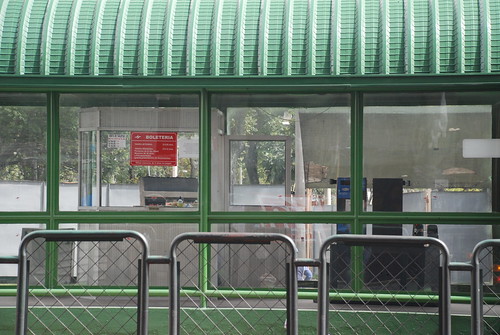
(When you ride on one of the limited-stop bus lines, a machine collects your 25-cent fare, but, it doesn't give change. So there's a girl in a booth whose job is to make change. Give her a 50-cent piece and you get 2 quarters. In the evening there's also a guard, who sometimes will swing the gate on the pay-station open for you. It's interesting how machines don't eliminate jobs here.)
Anyway, I say 'good day' to these people, but I'm still working out when the afternoon ends and the night begins. Here on the equator, night-fall only varies about half an hour during the year (and dawn moves in synch, so days and nights don't vary in length.) So you'd think dusk would be a natural switch-over time, but I've been told 'buenas tardes' after dark. It's a little awkward when you disagree with a stranger about what part of the day you're in. In the States, I have a habit of saying 'good morning' well into the afternoon, and my students are quick to tell me, "It's not morning anymore!" Lots of times people just say 'buenas' by itself, avoiding the problem all together, so it's a little hard to figure out what part of the day people think it is.
The distinctions also apply to describing times of day. Even though they write times as though they use a 24-hour clock here--9 p.m. is 21h00--they don't talk about times higher than 12. So do you tell someone to meet for dinner at 7 de la tarde or 7 de la noche? I haven't actually needed to make such a distinction yet, but it got me thinking about how we do it in English.
Even though we think of 1 or 2 a.m. as night, as far as the English language goes, the day starts at midnight, so it's 12:01 in the morning. Lots of times it's morning from before you go to bed until the sun is straight overhead the next day: 12 whole hours. For me afternoon runs up till 6 p.m. 5:30 in the afternoon is is fine, but it seems a little weird to say 6 in the afternoon. English is a little more complicated than Spanish because we've got evening in between afternoon and night, and it only lasts a couple of hours: between 6 and 7 in the evening. It wouldn't seem completely out of place to say 7 at night, but on the other hand, 9 in the evening sounds rather cosmopolitan, like you might not be able to make it to a show that starts that early because you probably haven't gotten around to eating dinner by 9, in which case your night has barely begun by the time it's really already morning.
Maybe it's not just the language. Maybe the terms varies from place to place. Does afternoon stretch till 7 or 8 in Manhattan, while it's already night by then in rural Utah? Up north where there are seasons, do the words adjust their meanings as the days grow longer and shorter?
English gets even more confusing when you return to the greetings. At 10 or 11 at night, you don't say 'good night' to greet someone. You still say 'good evening.' 'Good night' is a farewell. To me, 'good afternoon' can work either way, but I'd never say 'good morning' on my way out the door on my way to work, but I could say 'good day.'
It's 10:30 at night, and I'm sitting on the roof, looking out over Quito's street lights as they crawl up the side of the mountain. It sounds like everyone else has already gone to bed--a half-filled hostel of weary travelers makes for a quiet night. It's probably time for me to head to bed as well, so I'll wish you good night!
No comments:
Post a Comment